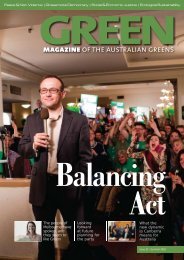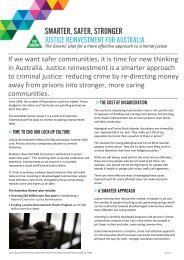news & views - Australian Greens
news & views - Australian Greens
news & views - Australian Greens
You also want an ePaper? Increase the reach of your titles
YUMPU automatically turns print PDFs into web optimized ePapers that Google loves.
Autumn 2007 ISSUE 22 PAGE 12<br />
Why Buy?<br />
The case for energy services<br />
LORI PUSTER<br />
Einstein gave us an equation describing how matter equals energy. Of course, we<br />
normally use this equation to calculate the potential energy which can be unleashed<br />
from matter. But it is equally true in the opposite direction: matter = ‘leashed’ energy,<br />
and when formed by human hands, usually a whopping great amount of it. And so, to<br />
significantly reduce our individual and collective consumption of energy, we have to<br />
reduce our individual and collective consumption of ‘matter.’<br />
The case of the car<br />
The most energy efficient automobile still represents huge amounts of energy expended in its manufacturing process. Every material<br />
thing contains embedded energy. In plants the process is fairly simple - their energy comes primarily from the sun and they<br />
convert it into themselves. In the case of a car, the energy comes primarily from fossil fuel, which runs the machinery that digs<br />
the ore, smelts the metals, casts and stamps, and machines, and assembles, and transports every bit of it every step of the way to<br />
its final destination. Not to mention all of the plastic parts processed from petroleum and similarly worked and transported. All<br />
that before you even put a litre of petrol in the tank!<br />
No matter how efficient we make cars, the greatest reduction in energy<br />
use will come from making fewer of them in the first place.<br />
For far too long, a combination of cheap energy (and cheap foreign labour) has enabled people in the western world to purchase<br />
goods more cheaply than services. Why hire someone to do odd-jobs around the house when the tools to do-it-yourself will cost<br />
less, and you get to keep the cool tools? Why go to the grocer everyday when the fridge will keep food in your kitchen? Why go<br />
to the laundromat when there’s your very own clothes washer in the laundry room? Houses themselves expanded to make room<br />
for all of our stuff. An economy dependent on continual expansion and mired in a production model also manufactured the need<br />
for each and every one of us to own one (or more) of nearly everything - a car (or two, or three) and a whole host of appliances<br />
and tools in every household. Ever increasing consumption was an economic winner, at least for some, and expressly encouraged<br />
by government policies. Of course, within businesses, such duplication is unnecessary and wasteful and continually weeded out.<br />
As a result of our personal goods, especially our personal transportation, we’ve become spread further apart and more rampantly<br />
independent than ever before. Energy efficient new housing developments and redevelopments can draw people back inwards<br />
and cluster them around the kind of local services that eliminate most car travel, and the need for individual clothes washers and<br />
refrigerators and similar appliances. But what about now, and what about the rest of us in the ‘burbs and beyond’?












